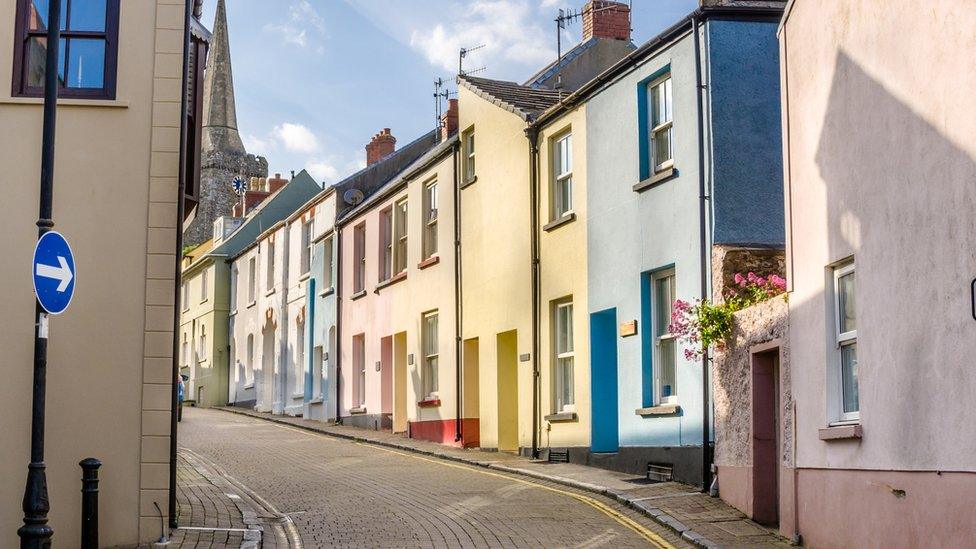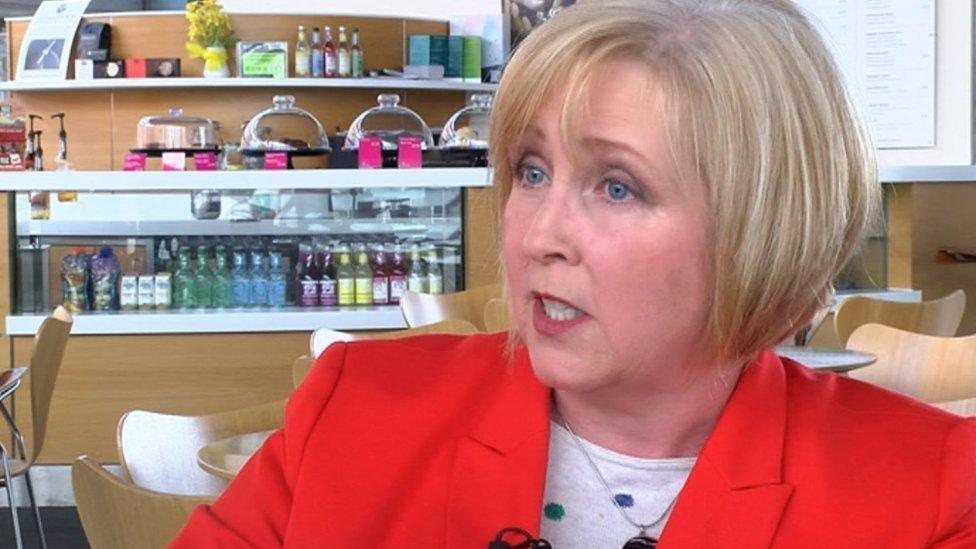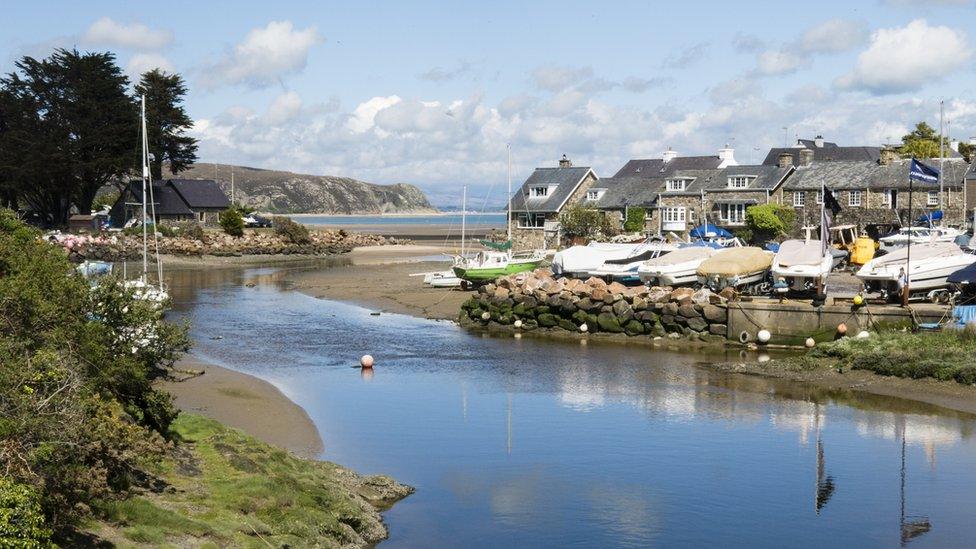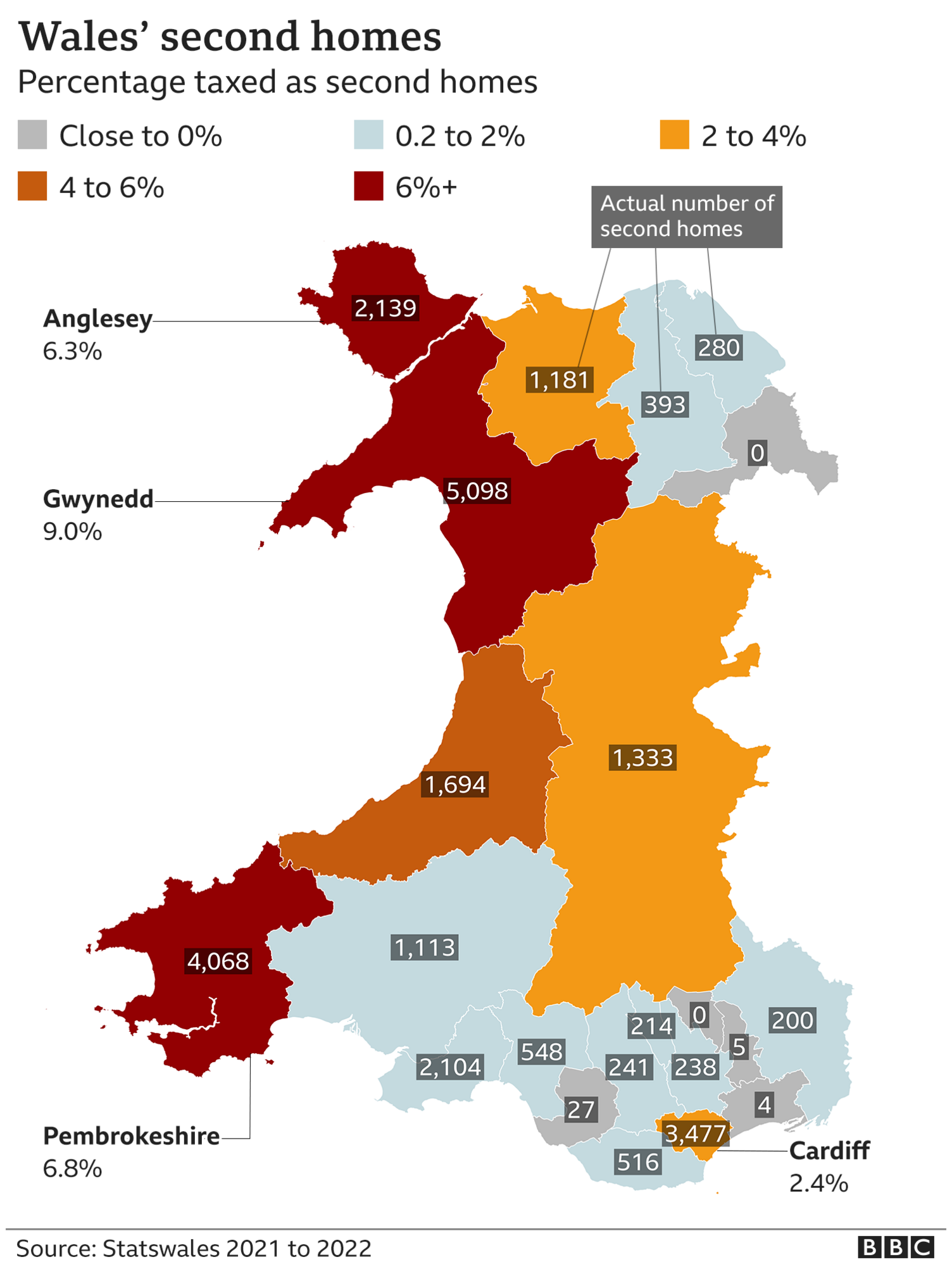Second homes in Wales: Warning test scheme may be too short
- Published

There were nearly 25,000 registered second homes in Wales at the start of 2021
A "long" time period is needed to see if policies to tackle Wales' second homes issue are having any effect, a leading tourism figure has warned.
Last November's Cooperation Agreement between Labour and Plaid Cymru promised "immediate and radical action" to tackle a second homes "proliferation".
But Wales Tourism Alliance chair Suzy Davies said a pilot scheme underway in Dwyfor, Gwynedd, "may be too short".
She also warned of "anger" in areas not having problems with second homes.
Meanwhile, housing industry representatives said they were struggling to understand what Welsh ministers' objectives were.
The Welsh government has launched a consultation, external on changing planning laws following concerns over ownership of second homes and short-term holiday accommodation and Dwyfor in Gwynedd, which includes the Llŷn Peninsula and the area west of Porthmadog, has been selected as a test area.
Ms Davies, a former Conservative Senedd member, said there was "some anger" in the "self-catering business sector that they are being dragged into conversations for bits of Wales that aren't really being affected by the problem" of second homes.
The Welsh government's second homes plan, announced after the Cooperation Agreement was unveiled, promised a two-phase approach.
The first phase included launching the pilot area, with the second phase to involve a longer-term consultation on powers to limit the creation of second homes and holiday lets, and more local tax varying powers.
"The young should not be priced out of the area they grew up"
Suzy Davies told the Senedd's Local Government and Housing Committee on Wednesday, as part of its inquiry into second homes, that "there is a flurry of activity at the moment, because it's a policy area that's of great interest to the Welsh government and indeed to certain parts of Wales".
"My point would be that you need a really long period of time to assess whether existing policies - such as the council tax premium - are having any material effect on the policy area that the government is interested in at the moment.
"My worry is that even the pilots in Dwyfor Meirionnydd may be too short in its length of time."

Suzy Davies represented the Conservatives in Cardiff Bay from 2011 to 2021
She added, "I think it's clear what the Welsh government is trying to do is to get to the bottom of what a balanced community looks like, and recognises, as indeed we do, that the balance has gone wrong in some communities, primarily in the north and west.
"That's not true, of course, for the whole of Wales. There is some anger in the self-catering business sector that they are being dragged into conversations for bits of Wales that aren't really being affected by the problem that's trying to be solved here.
"There's also a recognition, I think, that the status and presence of the Welsh language in certain parts of Wales is rightly a focus. Again, that plays differently in different parts of Wales, depending where you are.
"But the main objection we have to the way these consultations are being conducted is this conflation between letting businesses and the casual lets that sometimes occur through second homes or are bought to be casual lets, and the external narrative that occasionally goes around that."

The Welsh government plans to make £11m available to buy and refurbish empty homes within Gwynedd, Anglesey, Ceredigion, Carmarthenshire and Pembrokeshire
Housing industry figures told the committee they were struggling to understand what Welsh ministers' objectives were on second homes.
Sam Rees, from the Royal Institution of Chartered Surveyors, said the government's position was "not as clear as we would like".
"We've struggled to understand exactly what the Welsh government wants to get out of this investigation into second homes and what their policy priorities should be," he said.
Shomik Panda, director general of the UK Short Term Letting Association, said his understanding was that ministers wanted to "stabilise the number of second homes and to reduce them over time" and to "introduce a degree of local flexibility into future policies in recognition of the local impacts of second homes and holiday lets and to ensure that the benefits to communities are fairer" using regulation.
But he said: "The Welsh government needs to be a bit clearer in terms of what it wants to achieve with respect to second homes and what it wants to achieve with respect to holiday lets.
"The two issues are quite separate and shouldn't be confused."
"Taking punitive steps against short term lets is not necessarily going to reduce the number of second homes but it could deprive local communities of tourism related income.
"And we don't, for instance, feel that a diminution in supply of holiday lets would be beneficial to the Welsh economy."


Daryl McIntosh from Propertymark, which represents property agents, said there were a "lot of questions that probably need answering, starting on the definition of what's a second home, what's a short term let, what's a holiday let?"
What was ministers "end goal", he asked.
"Is it to ensure tourism remains in the country, is it encouraging homeownership, or is it to ensure that there is a home for for everybody?"
Related topics
- Published12 January 2022

- Published23 November 2021
